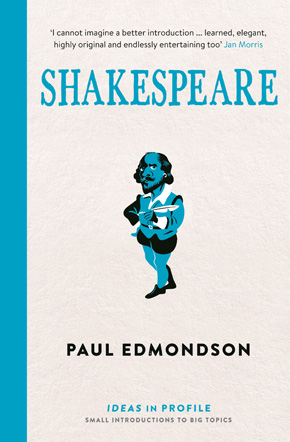A legacy like no other
by Paul EdmondsonShakespeare has mattered ever since his name first appeared in print in 1593 with his erotic and entertaining poem ‘Venus and Adonis’. He was 29 years old. For much of the poem the goddess of love is naked and begging for sex before Adonis, but he resists her advances. ‘Venus and Adonis’ was a sensation (it still can be to the first-time reader) and became the most printed of all of Shakespeare’s works in his lifetime with ten editions by the time he died in 1616. Unsurprisingly, the poem was popular among university undergraduates. In 1600, the poet and academic Gabriel Harvey observed that “the younger sort take much delight in Shakespeare’s ‘Venus and Adonis’.” Gullio, a character in one of the three Parnassus plays performed at around the same date by Cambridge students, says that he will honour “sweet Master Shakespeare” and that to do so he will sleep with a copy of ‘Venus and Adonis’ under his pillow.
Shakespeare certainly knew how to combine intellect with entertainment, literariness with popular appeal. He became a star, famous for a tone of voice and dramatic focus that challenged genres, broke moulds, and questioned who had the right to rule. He got under the skin of imagined rulers, as well as real ones. The courts of Queen Elizabeth I and King James I made much of Shakespeare whose companies performed before their monarch 170 times during his lifetime, and continued to do so long after his death for King Charles I, another Shakespeare enthusiast, who had grown up enjoying the plays. Shakespeare inspired his contemporaries who often alluded to his work. His friend and collaborator, John Fletcher, even wrote a sequel to The Taming of the Shrew which he called The Woman’s Prize, or The Tamer Tamed. Shakespeare has continued to be life-giving for successive generations of readers and theatre-goers. Today his popularity and significance are greater than ever.
From retellings for children to opera, orchestral music and musicals, paintings and ballets, popular media advertisements, novels and poems, political speeches, compulsory school assessments, and from stage productions to news reports about political crises, ‘Shakespeare’ is a large, multi-faceted conversation. What are the reasons for his astonishing international success, and why does he still matter so much to us?
The British Empire helped to establish an international currency for Shakespeare, but what is striking is how his work was adopted and appropriated by cultures that made him their own through translation, appropriation and adaptation. This was especially the case in America where, after the declaration of independence in 1776, Shakespeare became a captivating immigrant. When two future presidents, Thomas Jefferson and John Quincy Adams, visited Shakespeare’s Birthplace in 1786, Jefferson “fell upon the ground and kissed it” while Adams chipped off a piece of wood from what he was told was Shakespeare’s chair. Writing in his book Democracy in America about his nine-month journey across America in the 1830s, the young French aristocrat, Alexis de Tocqueville observed: “there is hardly a pioneer hut in which the odd volume of Shakespeare cannot be found. I remember reading the feudal drama Henry V for the first time in a log cabin.” Henry V remains one of the most popular plays in the States, especially among the culture of Shakespeare festivals: a big story for the big country.
In Macbeth I found a power so definite and undeniable, so all-embracing of my intellectual and theatrical interests and tastes, that Shakespeare quickly became the most challenging, disturbing, and imaginative phenomenon.”
Shakespeare has often been used to speak to people living within oppressive regimes, whether in apartheid South Africa, where Janet Suzman’s politically charged 1989 production of Othello at the Market Theatre, Johannesburg spoke powerfully to white and black audiences at a time when it seemed most needed, or Corinne Jaber’s brave, 2005 Afghan production of Love’s Labour’s Lost in Kabul which allowed men and women to perform together for the first time in thirty years (and at great personal cost to the actors who took part). Hamlet became (and perhaps still is) the most relevant Shakespeare play for many of the former Soviet Eastern-bloc countries, who found in it a parable about how the state can make inert the life of an individual. And Sonnet 66 has been translated many times to speak against political regimes in which “art [is] made tongue-tied by authority”.
I started relatively late, studying Macbeth with an inspirational teacher at my comprehensive school at the age of fourteen. I found within its language, story, performance (in the classroom, on audio recording and film, and in the theatre), characters and their relationships, dark imagination – which forces us to think about night, ravens, bloody daggers, murder, blood, tortured consciences, emotional and mental breakdowns, immense personal loss, trauma, and a nation torn apart by war – a power so definite and undeniable, so all-embracing of my intellectual and theatrical interests and tastes, that Shakespeare quickly became the most challenging, disturbing, and imaginative phenomenon that I had ever encountered. He wasn’t easy; I do not believe he ever has been. But if something within his work can catch you (it may be a phrase, an image, a moment of performance) then you may find yourself drawn into his landscapes, soundscapes, emotions and thought in a way that will make it clear why he is fully deserving of his reputation.
His work can shock, amuse, move, comfort, inform, entertain and appal. Shakespeare stares life in the face and shows us what life might be like if we hoped and imagined enough (“Prove true, imagination, O, prove true,” says Viola in Twelfth Night, or What You Will). Or he warns us what might happen if we were to behave cruelly. The whole of King Lear seems like a timeless prophecy about the collapse of civilisation: human beings can all too soon become “like monsters of the deep” and prey upon one another. Shakespeare is open about human desires, whether they are sexual, political, religious, pioneering, ambitious, compassionate or controlling. He presents emotions that he never felt (the guilt after murdering a monarch, for example), creates space for us to find something of ourselves in them, never preaches and always demands and deserves a complex response.
No one has any moral obligation to like his work but for those who do, that ‘like’ is probably best recognised as ‘love’. We seek to celebrate what we love and what matters to us, and that’s why I, with millions of others around the world, want to remember Shakespeare’s birthday every year.
 Paul Edmondson is Head of Research and Knowledge and Director of the Stratford-upon-Avon Poetry Festival for The Shakespeare Birthplace Trust. He has published numerous articles and books on Shakespeare and speaks at conferences and other Shakespeare-related gatherings around the world. He is a trustee of the British Shakespeare Association and the Rose Playhouse, Chair of the Hosking Houses Trust for women writers, and a priest in the Church of England. Shakespeare: Ideas in Profile is published by Profile Books in paperback and as an enhanced eBook. Read more.
Paul Edmondson is Head of Research and Knowledge and Director of the Stratford-upon-Avon Poetry Festival for The Shakespeare Birthplace Trust. He has published numerous articles and books on Shakespeare and speaks at conferences and other Shakespeare-related gatherings around the world. He is a trustee of the British Shakespeare Association and the Rose Playhouse, Chair of the Hosking Houses Trust for women writers, and a priest in the Church of England. Shakespeare: Ideas in Profile is published by Profile Books in paperback and as an enhanced eBook. Read more.
Author portrait © Christoph Müller


